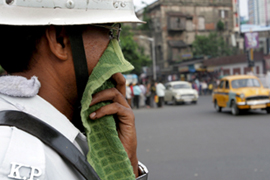India and China sign climate pact
The world’s two most populous nations sign deal to fight climate change.

| in depth | |||||||||||
|
India and China are among the world’s biggest polluters and both have rejected binding emissions cuts, arguing that carbon caps will hinder their quest to alleviate poverty in their countries.
“There is no difference between Indian and Chinese position [on climate change],” said Jairam Ramesh, the Indian environment minister, adding that their stance “fully protects and promotes the interests of developing nations”.
The signing of the pact comes after Al Gore, the former US vice-president, said that co-operation between the United States and China is crucial in fighting climate change.
Gore is in Beijing for a three-day forum on clean energy co-operation, and has urged the nations to work together on wind, solar and geothermal power.
“The strategic partnership between the United States and China, as it is beginning to emerge, is a fateful one, an important one, a crucial one, if the world is going to be successful in addressing this crisis,” he said at the forum.
Mounting pressure
Pressure has been mounting on the US to establish a position before the global conference in December.
Gore said he was confident the US Senate would pass a climate change bill before the conference and said a previously watered-down bill could be amended later to strengthen its provisions.
 |
| India and China agreed to cut carbon emissions as long as it does not hinder growth [EPA] |
Wealthy nations are seeking broad controls on emissions from all countries
in the new agreement, while developing countries say emissions limits would
obstruct their economic growth and that industrialised nations should carry most of the burden.
As a compromise, developing countries say they would be willing to accept
compensation for the economic costs of reducing greenhouse gas emissions. However, the environmental group Greenpeace said on Monday that at least $140bn a year will be needed.
On Wednesday, Hu Jintao, the Chinese president, said his government was hopeful
that the Copenhagen talks would be fruitful.
Hu promised in a speech at the United Nations last month to make
“substantial” reductions in China’s carbon dioxide emissions per unit of economic output.
